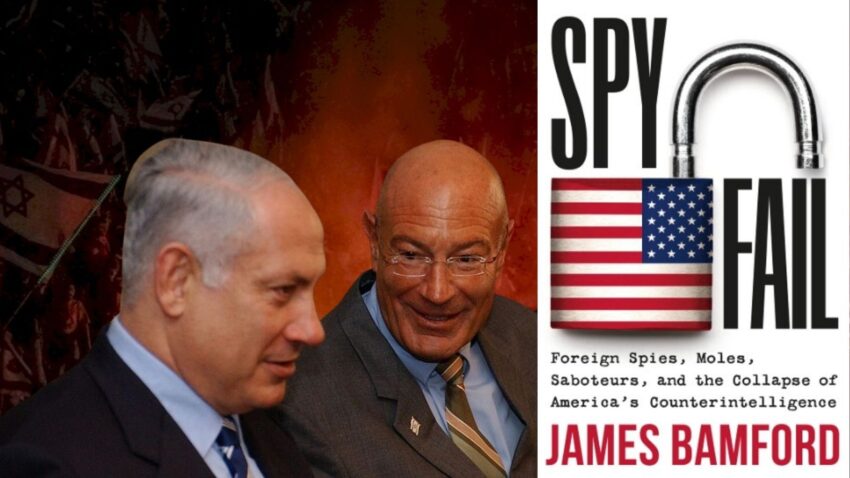James Bamford’s new book Spyfail: Foreign Spies, Moles, Saboteurs, and the Collapse of America’s Counterintelligence devotes nine chapters to the impunity of Israel, its spies and U.S. lobby.
Bamford is best known as America’s premiere chronicler of the ultra-secretive National Security Agency in his books The Puzzle Palace and The Shadow Factory.
Unlike most authors published through mainstream publishing houses, Bamford has not held back on exposing extremely damaging and behind the scenes exploits of Israel and its lobby in this damning look at U.S. counterintelligence. That was a shock to the second most prominent reader reviewer on Amazon.com who claimed, “I did not expect a full-throated anti-Israel screed completely devoid of nuance or historical context.” Most other reviewers were much more appreciative of Bamford’s honest take.
Among the most scandalous episodes chronicled in Spy Fail are stunning new details about Hollywood movie producer Arnon Milchan’s espionage and weapons smuggling operations targeting the United States.
Bamford follows Milchan’s early efforts to prop up apartheid South Africa through well paid weapons dealing and propaganda, including the production of feel good theatrical works depicting exploited blacks as happy with their lot in South Africa. Milchan’s recruitment into Israel’s Bureau of Scientific Relations Lakam spy agency then leaves him scouring the U.S. for nuclear weapons related technology.
Since Israel had already stolen enough U.S. weapons grade uranium to build atomic bombs from NUMEC, Milchan was tasked to obtain high speed switches that could provide the precisely timed pulses to trigger a detonation. Milchan recruited the hapless Richard Kelly Smyth to set up the front company “Milco” in Huntington Beach California by bedazzling the failing businessman with stars and starlets at his Hollywood parties.
Smyth provided the triggers and many other export prohibited items, but always managed to give away what he was doing to vigilant federal government authorities. Smyth (but not Milchan) was eventually indicted and fled overseas. When he sought help, Milchan ghosted him while working to stay ahead of the law.
Milchan benefitted from mainstream press support to spread the word that the billionaire had no idea what was going on in his global network of companies. Perhaps the most valuable diversion was the New York Time’s Tom Friedman who quickly got wind of the Smyth indictment and promoted Milchan’s innocence. While Bamford mentions the Netanyahu-Milchan connection he does not delve into Smyth’s revelation that Israel’s current Prime Minister Benjamin Netanyahu worked inside the “Project Pinto” krytron smuggling network at the Israel based Heli Trading company. Heli executed the purchase orders from the Israeli Ministry of Defense for export controlled items Milco misclassified and exported.
The devolution of the Milchan Netanyahu relationship is perhaps the most important revelation of extreme current relevance in the book. Milchan pressed Netanyahu to pressure U.S. Secretary of State John Kerry for a 10-year visa after the agency—finally wise to Milchan’s espionage—refused to renew it. The feckless John Kerry eventually acquiesced to Netanyahu and issued the visa. To this day Milchan continues to produce blockbusters and allegedly dodge taxes in the U.S.
But just as Milchan burned Smyth, Netanyahu began pumping Milchan for endless boxes of expensive cigars—“leaves”—and cases of $400 per bottle champagne—“bubbles”—and other gifts for his wife in exchange for the visa favor. Bamford’s depiction of this shakedown is as detailed as it is relentless.
The resultant Israeli corruption cases against Netanyahu have recently led him to seek judicial reforms, which could give his coalition power to shut the cases down. Netanyahu’s initiative has torn Israel apart and put the country on the verge of civil war as protesters sought to stop the gutting of court oversight.
Americans who read and fully digest Spyfail will come away with new insights about how the politicization of American counterintelligence produces media frenzies and scapegoats—such as Maria Butina—while continually steering clear of Israel’s hugely damaging covert intelligence operations against the U.S. Bamford pins this impunity squarely on the Israel lobby and the oversize role it plays in financing the political careers of ever-compliant U.S. elected officials and their political appointees.
Grant F. Smith is director of IRmep and forced the declassification and release of many of the NUMEC and “Project Pinto” documents cited in this book through FOIA lawsuits.

